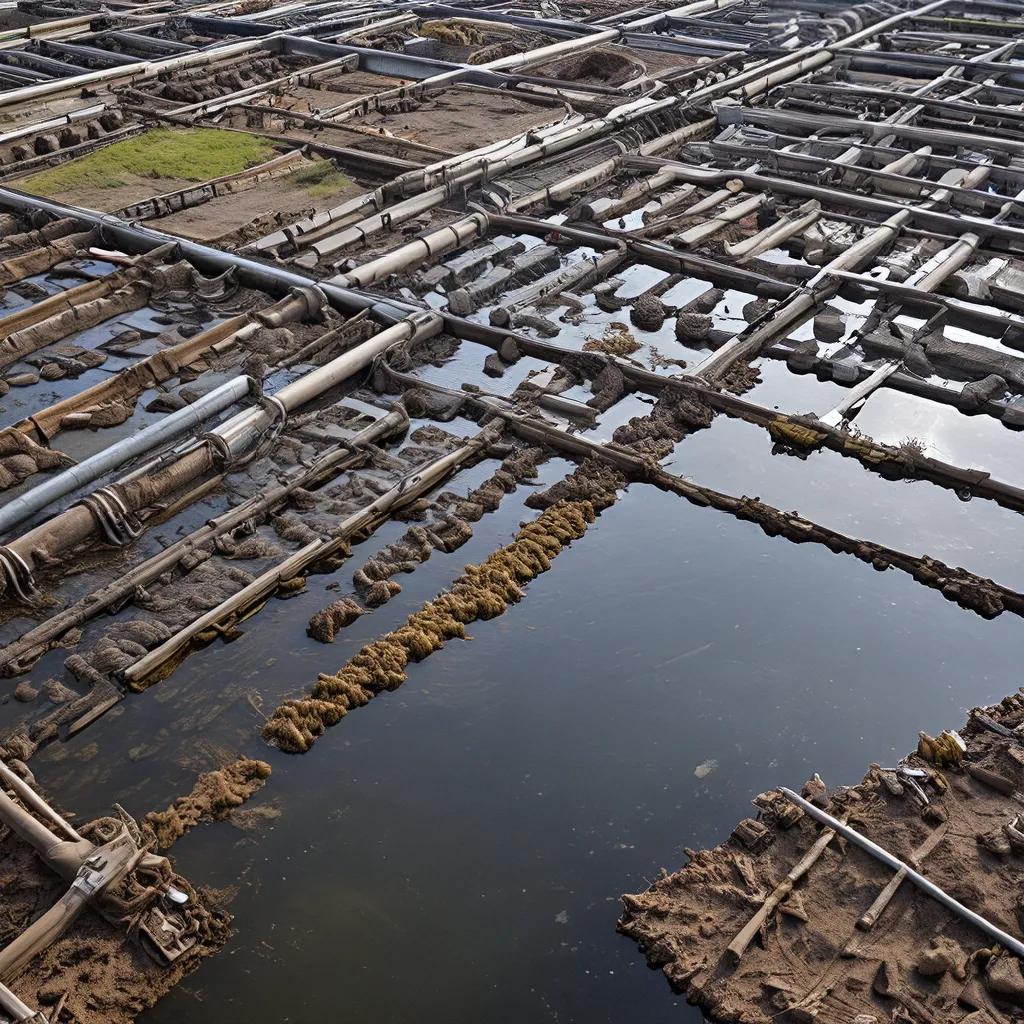
As an environmental enthusiast, I’ve always been fascinated by the complex relationship between water management and climate change. It’s a topic that often flies under the radar, but the ripple effect it can have on our communities is undeniable. Join me as we dive into this captivating intersection and unravel the challenges we face, the innovations on the horizon, and the role we all can play in creating a more sustainable future.
Wastewater’s Pivotal Role in the Climate Equation
When we think about climate change, our minds often jump to images of melting glaciers, rising sea levels, and extreme weather events. But what if I told you that the humble world of wastewater treatment is also a key player in this global drama? It’s true! Wastewater management is intricately tied to energy consumption, greenhouse gas emissions, and the overall resilience of our water systems.
You see, the process of treating and disposing of wastewater requires a significant amount of energy, primarily in the form of electricity and fossil fuels. This energy-intensive process contributes directly to our carbon footprint, making wastewater treatment a sizable contributor to climate change. In fact, studies have shown that the water and wastewater sectors account for around 3-4% of global electricity consumption and up to 5% of global greenhouse gas emissions.
But the story doesn’t end there. Climate change can also have a profound impact on wastewater infrastructure and operations. Extreme weather events, like intense storms and droughts, can overload or compromise wastewater treatment systems, leading to costly repairs and potential environmental disasters. Rising sea levels can also threaten coastal treatment facilities, putting critical infrastructure at risk.
It’s a complex and often underappreciated relationship, but one that we simply can’t ignore. As the effects of climate change become more pronounced, the need to address the water-energy nexus and find innovative solutions is more pressing than ever.
Innovative Approaches to Wastewater Management
The good news is that there are solutions on the horizon. Across the globe, researchers, engineers, and forward-thinking organizations are exploring new and innovative approaches to wastewater management that can help mitigate the impact of climate change.
One fascinating concept is the idea of resource recovery from wastewater. Instead of simply treating and disposing of wastewater, we can harness the valuable resources it contains, such as nutrients, energy, and even clean water. By recovering these resources, we can reduce our reliance on fossil fuels, minimize waste, and create a more circular, sustainable system.
For example, Alpha Wastewater, a leading provider of wastewater treatment services, has been at the forefront of this movement. They’ve developed innovative technologies that can extract methane gas from wastewater and use it to generate renewable energy, powering their treatment facilities and even feeding back into the grid. This not only reduces their carbon footprint but also creates a more self-sufficient and resilient system.
Another exciting development is the exploration of nature-based solutions for wastewater treatment. Instead of relying solely on energy-intensive mechanical systems, some communities are turning to constructed wetlands, bioswales, and other natural systems to treat and filter their wastewater. These “green infrastructure” approaches mimic natural ecological processes, often using plants, microorganisms, and soil to remove contaminants. Not only are they more environmentally friendly, but they can also provide additional benefits like habitat restoration, flood control, and carbon sequestration.
And the innovations don’t stop there. Researchers are also investigating ways to improve the energy efficiency of traditional wastewater treatment plants, through the use of advanced technologies, optimization of processes, and the adoption of renewable energy sources like solar and wind power. By reducing the energy demands of these facilities, we can significantly lower their carbon footprint and contribute to the fight against climate change.
Empowering Communities and Driving Change
As exciting as these technological advancements are, the true power of addressing the wastewater-climate change nexus lies in the collective action of communities, policymakers, and individuals.
Natasha Hall, an expert in the field of water security, highlights the importance of community engagement and education in this process. By raising awareness and empowering local stakeholders, we can foster a deeper understanding of the interconnected challenges we face and inspire grassroots initiatives that drive sustainable change.
Giorgi Gigauri, an advocate for the water-energy nexus, emphasizes the critical role of policy and regulation in shaping a more sustainable future. Governments and policymakers must prioritize the integration of climate resilience and resource recovery strategies into wastewater management frameworks, providing the necessary incentives and support for communities to adopt these innovative approaches.
But the responsibility doesn’t stop there. Each of us, as individuals, can contribute to the solution by adopting water-conscious behaviors, supporting sustainable initiatives, and advocating for change in our local communities. Something as simple as being mindful of our water usage or supporting the development of green infrastructure can have a profound impact when multiplied across communities.
Embracing the Challenges, Celebrating the Possibilities
As I reflect on the intricate relationship between wastewater and climate change, I can’t help but feel a mix of concern and cautious optimism. The challenges are undeniable, but the possibilities for innovation and collective action are truly inspiring.
We are living in a time of great uncertainty, but also one brimming with potential. By understanding the impact of wastewater on climate change, and vice versa, we can work together to find the solutions that will ensure a more sustainable and resilient future for all.
So, let’s not shy away from the complexities of this issue. Instead, let’s dive in head-first, exploring the latest research, championing the groundbreaking innovations, and empowering our communities to be part of the solution. The road ahead may not be easy, but with determination, creativity, and a shared commitment to our planet, I believe we can navigate these waters and emerge stronger than ever before.